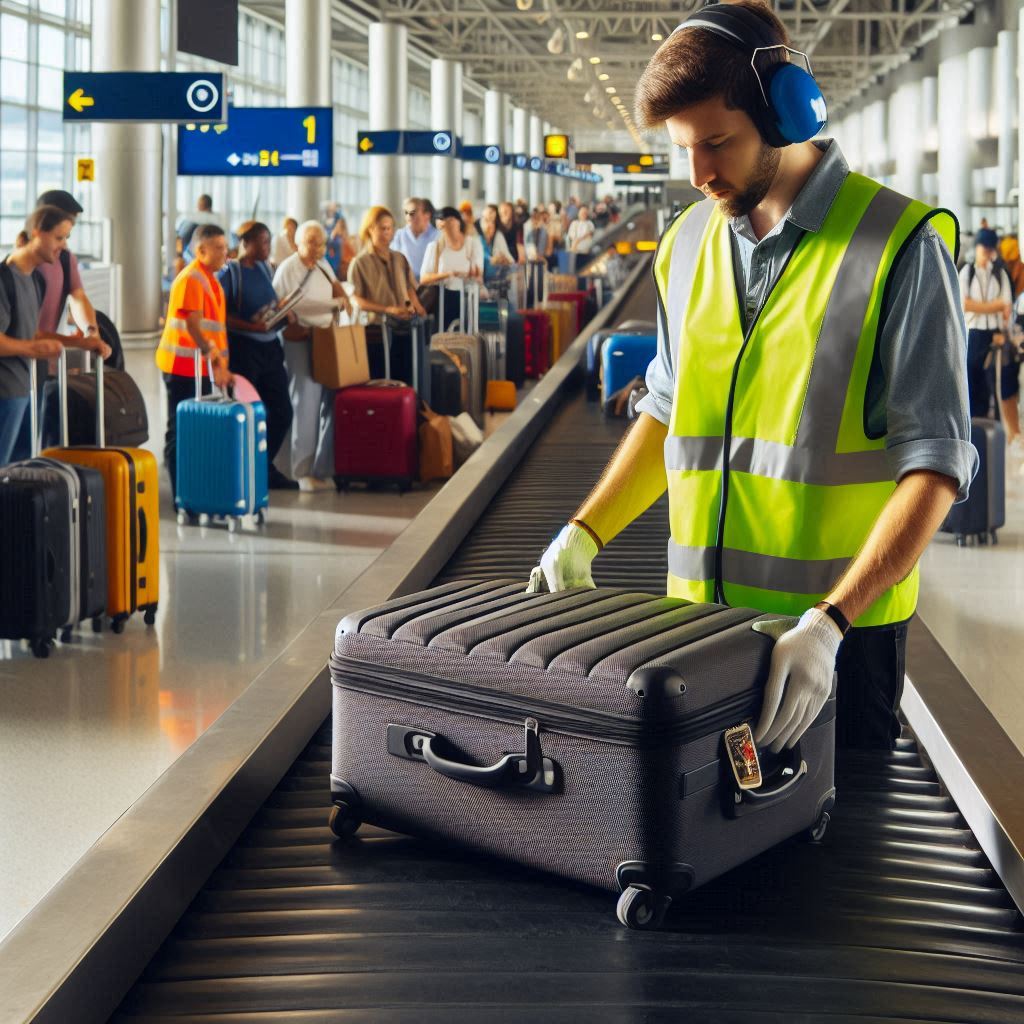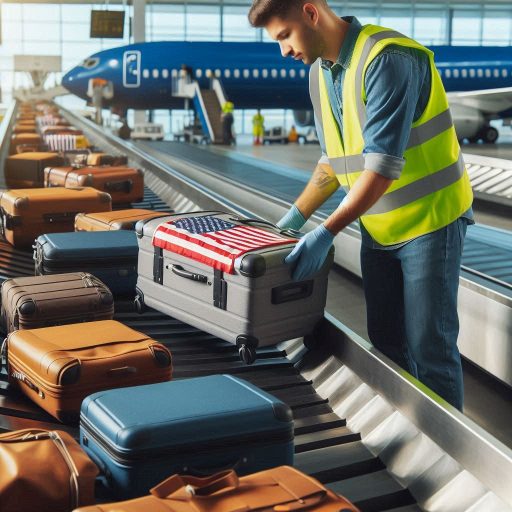Introduction
Baggage handling can be a highly stressful job.
Workers face numerous challenges that contribute to stress levels.
The fast-paced airport environment requires constant movement and quick decision-making.
Handling heavy luggage can lead to physical strain and fatigue.
Baggage handlers must often work irregular hours, including nights and weekends.
These unpredictable schedules disrupt personal lives and create additional stress.
Moreover, baggage handlers deal with high expectations from airlines and customers.
They must ensure timely and efficient service while maintaining safety standards.
Misplaced luggage and customer complaints can add to the pressure.
Each shift brings a new set of challenges, from managing tight deadlines to navigating complex logistics.
The emotional demands of the job can also weigh heavily on workers.
Baggage handlers often face frustration from travelers who experience delays or lost luggage.
This constant interaction with upset customers can be draining.
Furthermore, the physical nature of the job can lead to burnout if not managed properly.
Finding ways to handle stress is essential for baggage handlers.
Identifying effective coping strategies can lead to a more balanced and fulfilling work experience.
Addressing stress not only benefits workers’ health but also improves overall job performance.
Understanding the nature of the job
The Physical and Mental Demands of Being a Baggage Handler
Being a baggage handler is a physically demanding job.
Workers lift heavy luggage, maneuver through crowded areas, and operate equipment.
The physical strain can lead to fatigue and exhaustion.
Additionally, baggage handlers often work irregular hours, including nights and weekends.
This schedule can disrupt sleep patterns and lead to chronic tiredness.
Mental demands are equally significant.
Baggage handlers must stay focused while working in a fast-paced environment.
They often face tight deadlines and high expectations.
Quick thinking and problem-solving skills are essential for managing unexpected issues.
Dealing with difficult passengers or resolving logistical problems adds to the stress.
The combination of physical and mental challenges can take a toll on overall well-being.
Recognizing Job-Related Stressors
Awareness of job-related stressors is crucial for baggage handlers.
Identifying stressors helps workers manage their impact on daily life.
Common stressors include physical exhaustion, tight schedules, and poor communication.
Additionally, working in a noisy environment can increase feelings of anxiety.
Baggage handlers often face pressure during peak travel times.
These busy periods can lead to a heavier workload and heightened stress levels.
Knowing these peak times can help workers prepare mentally and physically.
Planning ahead can alleviate some of the stress associated with sudden increases in workload.
Moreover, inadequate breaks can contribute to stress.
Baggage handlers need sufficient time to rest and recharge.
Recognizing when fatigue sets in is important for maintaining performance and health.
Employers should provide regular breaks to help mitigate stress levels.
Strategies to Manage Stress Effectively
Managing stress requires proactive strategies.
One effective approach is to establish a routine.
Regular schedules for meals, exercise, and sleep promote overall well-being.
Engaging in physical activity outside of work helps relieve tension.
Simple exercises, such as stretching, can be done during breaks to reduce muscle strain.
Mindfulness practices can also be beneficial.
Techniques such as deep breathing or meditation help workers focus and relax.
These methods allow baggage handlers to clear their minds and reduce anxiety.
Incorporating short mindfulness sessions into the workday can enhance mental clarity.
Effective communication is key to reducing stress.
Baggage handlers should feel comfortable discussing concerns with supervisors.
Open communication can foster a supportive work environment.
When employees feel heard, they experience less stress and greater job satisfaction.
The role of a baggage handler is physically and mentally demanding.
Being aware of job-related stressors is vital for maintaining health and performance.
By implementing effective stress management strategies, baggage handlers can navigate their challenges more successfully.
Taking proactive steps toward well-being can lead to a more fulfilling work experience.
Prioritize self-care
The Significance of Self-Care in a High-Stress Job
Baggage handling is a physically demanding and high-stress job.
Long hours and tight deadlines contribute to increased stress levels.
To cope effectively, baggage handlers must prioritize self-care.
Taking care of oneself is not just a luxury; it’s a necessity for maintaining mental and physical health.
When you feel good, you perform better at work.
Neglecting self-care can lead to burnout, fatigue, and decreased job performance.
By focusing on personal well-being, baggage handlers can manage stress more effectively.
This focus leads to a healthier work environment for everyone involved.
Tips for practicing self-care, such as getting enough rest and eating well
Getting Enough Rest
One of the most crucial aspects of self-care is getting enough rest.
Adequate sleep is essential for recovering from the physical and mental demands of baggage handling.
Aim for at least seven to eight hours of sleep each night to ensure your body and mind are well-rested.
Establishing a regular sleep schedule can significantly improve your sleep quality.
Limiting screen time before bed helps you relax and prepare for sleep.
If you struggle to fall asleep, consider calming activities, such as reading or meditating.
During your shifts, power naps can recharge your energy levels.
Remember, adequate rest enhances focus, reduces stress, and improves overall performance.
Eating Well
Eating well also plays a crucial role in managing stress.
Nutrition directly impacts energy levels and mood.
A balanced diet helps maintain the stamina needed for physically demanding work.
Incorporate plenty of fruits, vegetables, and whole grains into your meals.
Avoid excessive caffeine and sugary snacks, as they can lead to energy crashes.
Instead, opt for healthy snacks like nuts, yogurt, or fresh fruit.
Staying hydrated is equally important, so make sure to drink plenty of water throughout your shifts.
Planning meals ahead of time ensures you have healthy options readily available, reducing the temptation to grab unhealthy foods on the go.
Regular Exercise
Regular exercise is another effective way to combat stress.
Engaging in physical activity helps release endorphins, boosting your mood and reducing anxiety.
Aim for at least 30 minutes of exercise most days.
Find activities that you enjoy, such as walking, cycling, or yoga, to make it easier to stay consistent.
Incorporating movement into your daily routine enhances your resilience to stress and improves overall well-being.
Practicing Mindfulness
Practicing mindfulness techniques can also help you stay grounded amid the chaos of baggage handling.
Taking a few minutes each day to practice deep breathing or meditation can help clear your mind.
Focus on the present moment and let go of distractions.
Mindfulness reduces anxiety and promotes relaxation, making it easier to handle stress.
Finally, don’t underestimate the importance of social support.
Connecting with coworkers, friends, or family members about your experiences can alleviate stress.
Sharing your thoughts and feelings helps create a support network.
Participating in group activities or hobbies outside of work strengthens these social connections and enhances your overall well-being.
In closing, taking care of oneself is crucial for baggage handlers facing high-stress situations.
By prioritizing rest, nutrition, exercise, mindfulness, and social connections, baggage handlers can manage stress more effectively and maintain a healthier work-life balance.
Read: Nail Technician Etiquette: Dos and Don’ts
Develop coping mechanisms
Importance of Developing Healthy Coping Mechanisms for Stress
As a baggage handler, managing stress is crucial for your well-being.
The fast-paced environment can create overwhelming pressure.
Stress can lead to burnout and impact job performance.
Developing healthy coping mechanisms helps you deal with stress more effectively.
When you learn to manage stress, you improve your focus and productivity.
Healthy coping strategies can enhance your overall job satisfaction and mental health.
By recognizing the importance of coping mechanisms, you can create a more balanced work life.
These strategies allow you to navigate stressful situations with greater ease.
Investing time in stress management also fosters resilience, helping you bounce back from challenges.
Ultimately, effective coping mechanisms empower you to maintain your energy and enthusiasm at work.
Examples of Coping Strategies, Like Deep Breathing Exercises or Taking Short Breaks
One effective coping strategy is deep breathing exercises.
Deep breathing helps calm the mind and reduce anxiety.
When stress levels rise, take a moment to focus on your breath.
Inhale deeply through your nose, filling your lungs with air.
Hold your breath for a few seconds, then exhale slowly through your mouth.
Repeat this process several times to center yourself.
Deep breathing exercises can be done anywhere, even in the busy baggage area.
Taking just a few minutes to breathe can make a significant difference.
This simple technique lowers heart rates and promotes relaxation.
By practicing deep breathing regularly, you train your body to respond to stress more effectively.
Taking short breaks during your shift is another effective strategy for managing stress.
Working long hours without rest can increase feelings of overwhelm.
Plan brief breaks to recharge and clear your mind.
Use this time to step away from your work area, even for just five minutes.
A quick walk around the airport can help refresh your perspective.
During your break, focus on something enjoyable or relaxing.
This could be listening to music, stretching, or enjoying a snack.
Engaging in these activities can help shift your focus away from stressors.
Regular breaks allow you to return to work with renewed energy and concentration.
Incorporating mindfulness practices into your routine can also help manage stress.
Mindfulness encourages you to stay present and aware of your surroundings.
This can help reduce anxiety and improve focus.
Try taking a moment to notice your surroundings while working.
Pay attention to the sounds, sights, and smells around you.
By practicing mindfulness, you can create a sense of calm in a hectic environment.
This practice helps ground you, making it easier to cope with stress.
Over time, mindfulness can become a natural part of your workday, improving your overall mental health.
Handling stress as a baggage handler is essential for your well-being.
Developing healthy coping mechanisms, such as deep breathing exercises, taking short breaks, and practicing mindfulness, can significantly improve your ability to manage stress.
Implement these strategies to foster a more balanced and enjoyable work experience.
Read: Developing Patience and Precision in Pet Grooming
Seek support
Seek Help from Colleagues and Friends
As a baggage handler, it’s essential to seek help when stress becomes overwhelming.
Your colleagues understand the unique pressures of the job.
They can offer valuable support and share coping strategies.
Building strong relationships with coworkers fosters a supportive work environment.
Regularly checking in with each other can help identify stressors before they escalate.
Don’t hesitate to lean on friends outside of work, too.
They can provide a different perspective on your challenges.
Talking to someone you trust helps relieve the burden of stress.
Friends can also distract you from work-related issues, offering a fresh outlook.
Additionally, consider joining a support group for baggage handlers.
These groups provide a safe space to discuss shared experiences.
Connecting with others facing similar challenges can be reassuring.
You will realize you are not alone in your struggles.
Sharing your feelings in these settings can ease the emotional load.
Professional Support is Key
Sometimes, stress can become too much to handle alone.
In these cases, seeking help from mental health professionals is crucial.
Therapists and counselors can offer coping strategies tailored to your specific situation.
They can provide tools to manage stress effectively and improve your overall well-being.
Professional support can help you address underlying issues contributing to your stress.
Engaging with a mental health professional allows for open discussions without judgment.
This can lead to greater self-awareness and healthier coping mechanisms.
Remember, asking for help is a sign of strength, not weakness.
Benefits of Talking About Stress
Talking about stress can be incredibly beneficial.
Verbalizing your feelings helps release pent-up emotions.
This process can lighten your emotional burden and provide clarity.
When you articulate your stressors, you may gain insights into your feelings.
Identifying specific issues can make them feel more manageable.
Discussing stress with others fosters connection and understanding.
It encourages an open dialogue about mental health in the workplace.
This can help normalize discussions around stress, making it easier for others to seek help.
Creating a culture of support is essential in high-pressure environments like baggage handling.
Moreover, sharing your experiences may inspire others to open up about their struggles.
This creates a supportive network, where employees feel comfortable discussing mental health.
When everyone feels supported, job satisfaction and morale improve.
In review, handling stress as a baggage handler involves seeking help from colleagues, friends, and mental health professionals.
Openly discussing stress provides numerous benefits, fostering a supportive environment.
Remember, you are not alone in your experiences.
By seeking support and talking about your feelings, you can effectively manage stress and improve your overall well-being.
Prioritize your mental health, and encourage others to do the same.
Read: Tips for Nail Technicians Working in High-End Salons

Set boundaries
The Importance of Setting Boundaries to Avoid Burnout
Setting boundaries is crucial for preventing burnout as a baggage handler.
The demands of the job can quickly lead to physical and emotional exhaustion.
Without clear boundaries, you may find yourself overwhelmed by work responsibilities.
This can negatively impact your mental health and overall job performance.
Establishing boundaries helps you maintain a healthy work-life balance.
When you set limits on your work hours, you create time for self-care and relaxation.
This balance is essential for recharging your energy and reducing stress.
Furthermore, clear boundaries enhance your focus and productivity at work.
When you know when to step back, you can perform your tasks more efficiently.
Additionally, boundaries foster healthier relationships with colleagues.
By setting limits on your availability, you encourage respect among coworkers.
They will understand your need for personal space and downtime.
This can lead to a more supportive work environment where everyone feels valued.
Tips for Establishing Boundaries
Learning to say no is a vital skill for establishing boundaries.
Recognize that you cannot take on every task or responsibility.
When asked to help with additional work, assess your current workload first.
If you feel overwhelmed, politely decline or negotiate a later deadline.
Remember, it’s okay to prioritize your own well-being.
Delegating tasks is another effective way to maintain boundaries.
If you are part of a team, share responsibilities with your coworkers.
Communicate clearly about what you can handle and what needs to be shared.
By distributing tasks, you reduce the pressure on yourself while fostering teamwork.
This collaborative approach benefits everyone and encourages mutual support.
Creating a designated workspace can also help establish boundaries.
If you work in a shared area, find a specific spot that is yours.
This physical separation signals to others that you are focused on your tasks.
It also helps you mentally disconnect from distractions when necessary.
Establishing clear communication is key to setting boundaries.
Let your colleagues and supervisors know your availability.
Be transparent about your workload and capacity.
This honesty helps others understand your limits and encourages them to respect your time.
Setting specific work hours is essential for maintaining boundaries.
Clearly define your start and end times, and stick to them.
Avoid checking work emails or messages outside of these hours.
This separation allows you to focus on personal time, reducing stress and preventing burnout.
Generally, setting boundaries is vital for avoiding burnout as a baggage handler.
By learning to say no, delegating tasks, and creating a dedicated workspace, you can protect your well-being.
Establishing clear communication and maintaining defined work hours enhances your work-life balance.
Prioritize your mental health and embrace these strategies to create a healthier, more sustainable work environment.
Transform Your Career Today
Unlock a personalized career strategy that drives real results. Get tailored advice and a roadmap designed just for you.
Start NowRead: Understanding Pet Grooming Safety Standards
Practice mindfulness
The Benefits of Mindfulness for Stress Reduction
Mindfulness is an effective tool for reducing stress and enhancing mental well-being.
It encourages you to focus on the present moment.
This practice helps you step back from daily pressures and distractions.
By cultivating mindfulness, you can improve your ability to handle stress.
Research shows that mindfulness reduces anxiety and increases emotional resilience.
Practicing mindfulness allows you to observe your thoughts and feelings without judgment.
This perspective helps you gain clarity and understanding of your stressors.
Over time, mindfulness can improve your overall mental health.
It promotes a greater sense of calm and peace in your life.
Additionally, mindfulness can improve your focus and productivity at work.
By training your mind to concentrate, you become more efficient in your tasks.
This can lead to a more satisfying work experience as a baggage handler.
Ultimately, incorporating mindfulness into your life can lead to lasting positive changes.
Suggestions for Incorporating Mindfulness into Daily Routines
Incorporating mindfulness practices into your daily routine can be simple and rewarding.
Start with short, focused breathing exercises.
Take a few minutes each day to focus solely on your breath.
Inhale deeply through your nose, hold for a moment, then exhale slowly through your mouth.
This practice helps center your mind and relax your body.
Consider adding mindfulness meditation to your routine.
Set aside time each day, even just five to ten minutes.
Find a quiet space, sit comfortably, and close your eyes.
Focus on your breath or a specific mantra.
Allow thoughts to come and go without judgment.
This practice helps cultivate a deeper sense of awareness.
You can also practice mindfulness during daily activities.
For instance, when eating, focus on the flavors and textures of your food.
Chew slowly and savor each bite.
This simple practice encourages you to be present and appreciate your meals.
Mindfulness walks can be another effective way to incorporate this practice.
During breaks or after work, take a walk outside.
Pay attention to your surroundings, including sounds, smells, and sights.
Notice how your body feels as you move.
This exercise helps ground you in the moment and provides a mental reset.
Incorporating mindfulness into your commute can also be beneficial.
Whether driving or using public transportation, focus on your breathing.
Use this time to reflect on your day and release tension.
In general, mindfulness offers significant benefits for reducing stress and improving mental well-being.
By incorporating mindfulness practices into your daily routine, you can enhance your resilience as a baggage handler.
Simple techniques like breathing exercises, meditation, and mindful walking can lead to lasting positive changes.
Embrace mindfulness to cultivate a greater sense of calm and clarity in your life.
Prioritize your mental health and watch how it transforms your work and personal experiences.
Find ways to relax and unwind
The Importance of Relaxation After Work
Finding activities to relax and unwind after work is essential for baggage handlers.
The physical and mental demands of the job can be overwhelming.
Engaging in relaxing activities helps reduce stress and restore energy.
This downtime is crucial for maintaining overall well-being and preventing burnout.
Prioritizing relaxation allows you to shift focus from work-related pressures.
It helps create a clear boundary between work and personal life.
This separation is vital for mental health and emotional balance.
When you take time to unwind, you recharge your body and mind.
This enhances your ability to handle stress in future work shifts.
Suggestions for Relaxing Activities
Incorporating exercise into your routine can be an excellent way to relieve stress.
Physical activity releases endorphins, which boost your mood and energy levels.
Simple activities like walking, jogging, or cycling can be effective.
You don’t need a gym membership; outdoor exercise can provide a refreshing change of scenery.
Consider joining a fitness class or participating in group sports.
These activities not only promote physical health but also encourage social interaction.
Connecting with others while exercising can enhance your sense of community and support.
Engaging in hobbies is another fantastic way to unwind.
Find an activity that sparks your interest and brings you joy.
Whether it’s painting, gardening, or playing a musical instrument, hobbies can provide an enjoyable escape from daily stressors.
Allow yourself the freedom to explore new interests, as they can become powerful outlets for relaxation.
Spending time with loved ones is vital for stress relief.
Connecting with family and friends provides emotional support and strengthens relationships.
Plan regular gatherings, such as family dinners or game nights.
These interactions foster a sense of belonging and help you feel valued.
You can also engage in simple activities with loved ones.
Cooking a meal together or going for a walk can create cherished memories.
These moments not only provide joy but also allow for open conversations about stress and life challenges.
Mindfulness and Relaxation Techniques
In addition to physical activities, consider incorporating mindfulness practices into your routine.
Techniques such as meditation or deep breathing exercises can promote relaxation.
Setting aside just a few minutes each day for mindfulness can help calm your mind.
This practice can improve your overall mental clarity and resilience against stress.
Yoga is another excellent way to combine physical activity with mindfulness.
It promotes relaxation, flexibility, and mental clarity.
Joining a local yoga class can introduce you to new techniques and help you unwind after a demanding day.
In summary, finding activities that help you relax after work is crucial for managing stress as a baggage handler.
Exercise, hobbies, and spending time with loved ones all play vital roles in your well-being.
Prioritize relaxation in your routine, and embrace these activities to foster a healthier, happier lifestyle.
Balancing work and personal life is essential for maintaining mental and physical health.
Conclusion
Managing stress as a baggage handler is crucial for maintaining both physical and mental well-being.
Throughout this blog, we explored several strategies for handling job stress effectively.
First, taking regular breaks can help prevent burnout.
Physical exercise, even during short breaks, can alleviate tension and boost energy levels.
Setting boundaries between work and personal life is also essential for maintaining a healthy work-life balance.
We emphasized the importance of communicating with supervisors or coworkers when feeling overwhelmed.
Open communication can lead to better teamwork and less pressure.
Additionally, practicing mindfulness techniques, such as deep breathing or meditation, can reduce immediate stress in high-pressure moments.
Seeking professional help, like counseling, can also offer valuable support for managing chronic stress.
Baggage handlers face physically demanding and often fast-paced environments, which makes prioritizing mental health critical.
Stress, if left unchecked, can lead to long-term health issues and reduced job performance.
By focusing on self-care, asking for help when needed, and practicing stress management techniques, baggage handlers can protect their well-being.
Remember, taking care of your mental health is as important as any other aspect of your job.
[E-Books for Sale]
The Big Book of 500 High-Paying Jobs in America: Unlock Your Earning Potential
$19.99 • 500 High-Paying Jobs • 330 pages
Explore 500 high-paying jobs in America and learn how to boost your career, earn more, and achieve success!
See All 500 High-Paying Jobs of this E-Book
1001 Professions Without a Degree: High-Paying American Jobs You Can Start Now
$19.99 • 1001 Professions Without a Degree • 174 pages
Discover 1001 high-paying jobs without a degree! Unlock career tips, skills, and success strategies for just $19.99!




